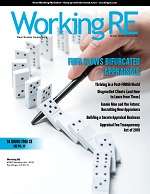 |
“One of the best courses that I have had in 17 years!” -Amy H. > Switch to OREP E&O Insurance: |
>> Take OREP/Working RE’s Bifurcated Appraisal Survey
Fannie Mae and the Future: Recruiting New Appraisers
by Isaac Peck, Editor
If you were to ask an appraiser about the general outlook of the profession, the answer you get might be pretty glum. Appraisers are worried about being cut out of the valuation process by Fannie Mae’s Appraisal Waivers and Freddie Mac’s Automated Collateral Evaluations (ACEs). Not to mention Fannie’s latest move to bifurcate the appraisal process, with its Value Verify program, where the inspection of the subject property, also called the Property Data Collection (PDC) by Fannie Mae, is completed by a third-party (either a licensed appraiser or not), with the actual valuation portion of the assignment being completed by a separate appraiser based on the data provided by the property inspector.
These numerous initiatives by Fannie Mae have been interpreted by many as an effort to minimize the role of the professional appraiser in today’s mortgage and real estate markets, with some appraisers wondering if the “powers that be” are seeking to get rid of appraisers for good.
In the face of all this, it is definitely surprising, if not slightly contradictory, to learn that Fannie has recently launched the Appraiser Diversity Pipeline Initiative (ADPI) as a way to attract new recruits to the appraisal profession. Does Fannie Mae see a future for appraisers?
Working RE recently sat down with Keisha Wilkinson, a General Certified Real Estate Appraiser who has worked at Fannie Mae in various roles since 2011, to learn more about Fannie’s new initiative and what is motivating Fannie to help recruit more individuals into the appraisal profession.
WRE: Fannie Mae has recently launched an initiative to help recruit new professionals into residential appraisal careers. Tell me about that initiative: what steps have you taken, and what’s the plan going forward?
Wilkinson: In late 2018, Fannie Mae, working with the National Urban League and Altisource, launched the Appraiser Diversity Pipeline Initiative (ADPI). The purpose of the initiative is to raise awareness of career opportunities available in the residential appraisal field and encourage diverse new entrants to the profession.
To accomplish these goals, we are focusing on hosting community events that provide in-depth information about what appraisers do, what career paths are open to them, and the steps to becoming an appraiser. You could say it’s like a “career day” at school—attendees hear firsthand from appraisers who talk about real-life experiences and answer questions. We started with events in Baltimore and Philadelphia, hosted by the local Urban League Entrepreneurship Centers.
In August 2019 the Appraisal Institute (AI) signed on to the initiative, announcing that they will co-lead the initiative with Fannie Mae. Continuing to work with the Urban League and Altisource, the effort expanded to host appraisal career workshops in Chicago and New Orleans by the end of the year. New incentives for would-be appraisers who attend the workshops and show enduring interest may include scholarships for trainee education, appraisal software, and other resources to help them navigate the education and training process.
WRE: Why did Fannie Mae launch the initiative? Why is this important to you?
Wilkinson: Real estate appraisers are important to Fannie Mae and play an important role in helping us assess the risk of our collateral, now and in the future. I became a Certified General real estate appraiser in 2006, and even then, I could see evidence of the statistics we hear about so much today. A majority of appraisers are over the age of 55, without enough new entrants to take their place in the next few years. There is also a lack of gender or racial diversity in the appraisal profession, so we see this as an opportunity to raise awareness of the appraiser profession and attract diverse new entrants at the same time.
For me personally, I have appraised residential and commercial property, worked in the field and in an office, and have had the pleasure of seeing a member of my own family successfully start her own appraisal shop with the flexibility to raise her young family at the same time. This is a great profession, providing much-needed services, and I’m thrilled to introduce new people to it.
WRE: Many appraisers believe that Fannie Mae is proposing significant changes to the valuation industry (the move towards appraisal waivers and PDCs, for example) that will substantially decrease the utilization and demand for residential appraisal services. Yet Fannie’s move to help recruit new professionals into the residential appraisal field seems to contradict the idea that residential appraisal work is going to decrease substantially. Can you address this perceived contradiction?
Wilkinson: Appraisals are very important to Fannie Mae in managing our risk. We offer appraisal waivers on a small percentage of the loans we acquire—mostly refinances with loan-to-value ratios below 80 percent. But we continue to require appraisals for the majority of loans that we purchase.
So while the appraisal is critical for most mortgage loans delivered to Fannie Mae, it is a “long pole in the tent” in the origination process. There are periodic shortages of appraisers in some markets that can lead to long waits and high prices for appraisals. Lenders and their borrowers quickly become frustrated with delayed loan closings and added costs. With more than half of appraisers nearing retirement, new career entrants are critical.
WRE: What would you say to a potential new appraiser recruit who is worried about the longevity of the residential appraiser career path? Does Fannie Mae see a future for appraisers for years to come?
Wilkinson: In our career workshops, we talk about the appraiser’s role in the history of real estate, as well as the exciting future of the appraisal profession. People have been predicting the end of the appraisal industry since shortly after the first appraisal was completed, but it hasn’t happened yet and we don’t see it in the future. While residential appraisals are used in the mortgage industry, they are also used for a variety of other purposes, including estate valuation, litigation and taxation support, public policy decision-making, and more. Appraisals continue to be needed in the mortgage industry, and these additional needs are not going away either.
WRE: How do you see the current role of the residential appraiser changing and evolving over time?
Wilkinson: Modernization of the residential property valuation process that is already underway means appraisers will work smarter and have more opportunities to specialize.
Historically, real estate appraisers have spent much of their time collecting data rather than developing a value opinion. With the enormous amount of data readily available today through the Internet and other sources, we expect the appraiser’s role will evolve into more of a market analyst and less of a data gatherer.
Appraisers are inquisitive, looking at data from a number of different angles to understand trends and the why of things, not just the what. Many appraisers in the future may want to specialize in analyzing and deciphering that data, or accurately recording the facts at property sites for other appraisers to analyze. We don’t see everyone or even a majority of appraisers making the switch to specialization in the near future, but it will probably happen at some point.
Whether future appraisers choose to specialize or to follow the traditional path of performing both property data collection and analyzing the facts to produce an expert estimate of property value, some of how they work will change. I’ll give you an example: In an audience poll at a recent real estate appraiser conference, 58 percent reported that they still use a clipboard as their primary way of collecting data. That was an amazing number considering that mobile apps currently in the market can save appraisers so much time by capturing data in the moment instead of them having to transfer their clipboard notes later. There is also new technology to simplify routine tasks like measuring and drawing sketches of the property. As these innovations evolve, and as new professionals enter the appraisal industry who are willing to embrace that technology to provide more standardized data with more accurate results, we see the real estate appraiser’s role becoming more efficient and even more valuable to the industry.
This evolution also presents intriguing new opportunities for appraisers to work in a variety of different ways, providing flexibility on working hours and location. Appraisers can run their own business or work for a company—there is no single career path. This flexibility promotes a healthy work-life balance: appraisers are often able to pivot working hours around family priorities, taking care of business at the most convenient and productive times of the day.
WRE: How will you measure the success of the initiative?
Wilkinson: In the long term, Fannie Mae wants to help enable a strong appraisal profession that offers attractive career opportunities to a diverse workforce. Our initiative is not the only effort to support appraisal careers: the Appraisal Qualifications Board has recently adjusted training requirements that have for years discouraged many potential entrants to the field. The U.S. Department of Veterans Affairs and others in the industry are working to attract veterans to the profession as a post military service career option. All of these efforts will work together.
In the short term, our reward is individual success stories like this one: in one of our career workshops in Baltimore, we met a bright young woman who was very interested in a future as a real estate appraiser. At the event, she met a member of our panel, a successful local real estate appraiser, who later agreed to take her on as a trainee. This is success: attracting motivated entrants to the profession through our awareness campaign.
WRE: What can stakeholders in the appraisal industry like OREP/Working RE, as well as boots-on-the-ground appraisers, do to help with the initiative?
Wilkinson: One thing we hear over and over is that potential appraiser trainees are discouraged by how difficult it is to find a mentor willing to provide the required on-the-job training. Appraisers can encourage new entrants to the profession by taking on trainees to help develop the next generation of appraisers. Other industry stakeholders can help to spread the word about appraisal career opportunities. Additionally, Fannie Mae is working with the Appraisal Institute to develop a scholarship fund for appraiser education and training. We look forward to working with industry stakeholders to build this much needed program.
About the Author: Isaac Peck is the Editor of Working RE magazine and the Vice President of Marketing and Operations at OREP.org, a leading provider of E&O insurance for appraisers, inspectors and other real estate professionals in 50 states. He received his master’s degree in accounting at San Diego State University. He can be contacted at isaac@orep.org or (888) 347-5273.
>> Take OREP/Working RE’s Bifurcated Appraisal Survey
The completion rate of the survey is 100%, meaning everyone answered every question. The average time to complete the survey is three minutes. You can add your voice and comments by taking the Survey here.
CE Online – 7 Hours (AQB Approved)
Identifying and Correcting Persistent Appraisal Failures
Richard Hagar, SRA, is an educator, author and owner of a busy appraisal office in the state of Washington. Hagar now offers his legendary adjustments course for CE credit in over 40 states through OREPEducation.org. The new 7-hour online CE course Identifying and Correcting Persistent Appraisal Failures shows appraisers how to avoid CU’s red flags, minimize callbacks, save time, and earn more! Learn how to improve the quality of your reports and build defensible reports! OREP insureds save on this approved coursework. Sign up today at
www.OREPEducation.org.
Sign Up Now! $119 (7 Hrs)
OREP
Insured’s Price: $99
>Opt-In to Working RE Newsletters
>Shop Appraiser Insurance
>Shop Real Estate Agent
Insurance
Send your story submission/idea to the Editor:
isaac@orep.org



